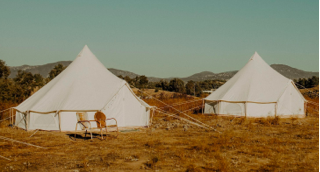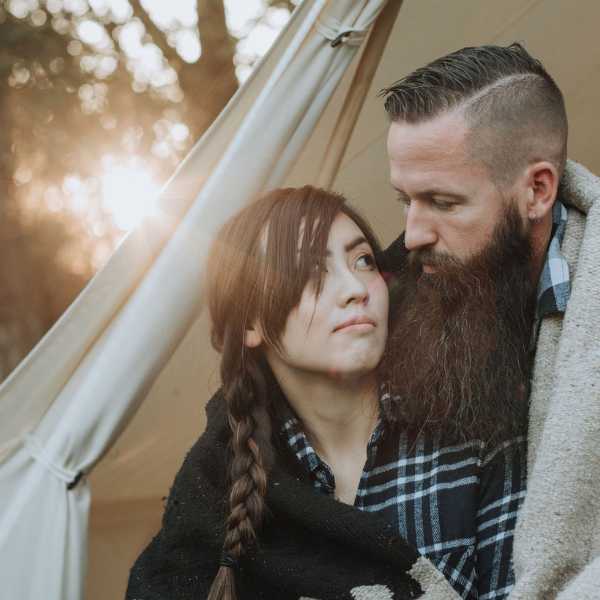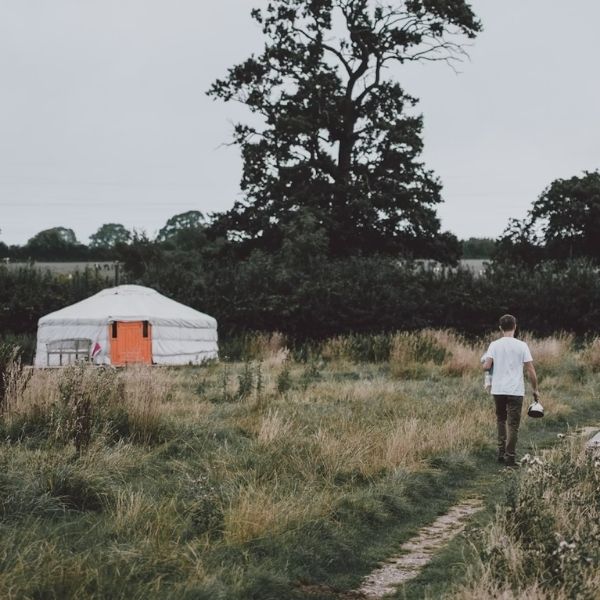PAY NO SALES TAX
Questions? CALL 971-220-8368
Free Shipping

Pay No Sales Tax
30-Month Warranty
PAY NO SALES TAX
Questions? CALL 971-220-8368
Tents
Shop


The LiT List
Glamping & Camping Ideas + Resources
Tips and Trick on How to Sleep Well While Camping
4 min read
Lack of artificial light, fresh air filling your lungs, physical activity, and far fewer electronic devices demanding your attention. Sleeping outdoors in a camping tent can reset your Circadian rhythm, leaving you feeling rested and restored.
But it doesn’t work for everyone.
Whether you can’t get shuteye because you’re at a multi-day camping festival, or you’re simply a light sleeper, here’s how to sleep well while camping and wake up bright-eyed and bushy-tailed.
Why You Can’t Fall Asleep Camping
Start by asking yourself: Why can’t I fall asleep?
Understanding what’s keeping you awake can help you face the problem. Is it the noises from critters and the wilderness outside your tent? Could it be that your sleeping pad isn’t comfortable enough? Or is it that you’re staring into the night void, worrying about all the troubles you were supposed to leave back home?
Whatever it may be, here’s a rundown of what to consider to catch some shuteye at the campsite, finally.
Tips and Tricks for Sleeping Well While Camping
Choose an Insulative Tent With Adequate Airflow
Sleeping outdoors and breathing in that fresh air has to be one of the best things about camping.
For summers when you wake up in a pool of sweat, choosing a well-ventilated tent with features like screened windows, doors, and ventilation points along the roof helps tremendously. For winter camping, avoid shivering all night long by keeping warm with a more insulating canvas tent and ground flooring.
On the other hand, some swear by hammock camping and prefer it to sleeping in a tent!
Give Yourself a Proper Camp Bed

One of the most proactive steps you can take to ensure a good night’s sleep while camping is to build a proper bed. There’s nothing worse than tossing and turning all night long just because you can’t get comfortable. Creating an insulating, plush, and warm sleep setup is crucial.
Start with a thick and warm camp pad designed with the appropriate temperature rating.
Add to it a sleeping bag or quilt. If you get claustrophobic or feel trapped inside traditional sleeping bags, or need space to shift and stick a leg out to cool off while sleeping, consider swapping it out for a quilt. Or choose a sleeping bag that unzips and doubles in size.
Finding the right camp pillow can be tricky. So why fight it? Unless you need to pack light, bring your personal pillow from home.
Wear Eye Masks
If you unwillingly wake up at dawn and want to sleep in, or if any trace of light sends signals to your brain to rise and shine, an eye mask will save you. While many campers recommend blackout tents, not everyone is willing to give up their favorite tent. Not to mention, blackout tents come with disadvantages such as poor airflow and the ability to bake like an oven. Eye masks, on the other hand, are versatile and can be used anywhere!
Wear Ear Plugs or Noise-Canceling Ear Buds
You can’t always control the noise around you. If you’ve ever tried sleeping at a camp music festival, you know this fact all too well. If noise is keeping you awake, earplugs or noise-cancelling earbuds offer a simple solution.
Use White Noise
White noise sounds are a smart way to distract and tone out others. You can do this through earbuds or even just camping near a steady stream or babbling brook.
Alternatively, a white noise machine is perfect for blocking out external noises for you and everyone sleeping in the tent, especially when camping with the family. A white noise machine will help distract anxious dogs and kids from waking at every snap of a twig or rustle of leaves outside the tent.
Tire Yourself Out / Exhaust Yourself

Another way to fall asleep fast is to tire yourself out. Plan some daily physical activity, such as a long hike or a day of sightseeing, to really exhaust your body thoroughly. Even if all you do is a set of jumping jacks before bed, it could do the trick.
Nightcaps, Teas, Melatonin, and More

A tried-and-true way to wind down for the evening is to relax the body and mind. Chamomile tea, a sleep aid like melatonin or magnesium, or even a nightcap can help you relax and sleep more deeply.
Stick to Your Bedtime Rituals
Like having a soothing cup of tea to wind down, a bedtime ritual signals to your body and mind that it’s time for rest, helping you fall asleep. So stick to the usual routine – brushing teeth, a warm shower, changing into sleepwear or pajamas, reading a chapter in a book – whatever it is you do at home to signal it’s time to sleep.
Final Thoughts
If you have trouble sleeping at home, the problem could follow you to the great outdoors. On the flipside, many folk sleep better while camping and even do so to recharge! However, most people become extremely hypervigilant when sleeping in unfamiliar surroundings, and camping is no exception.
So remember!If you already struggle to sleep, consider what’s keeping you up and make adjustments. Also, give yourself time to acclimate. Sleeping in a new environment, whether it’s a tent, hotel, or even a new mattress, brings a certain degree of excitement and stimulation, and for most, it takes a night or two to adjust.
It’s also important to know that sleeping outdoors takes practice. Allow yourself to adjust, and you’ll be sleeping like a baby in no time.
Related Resources

THE LIT LIST 4 min read
Valentines Day Gifts For Camping and Campers
Buying a valentines day gift for your loved one should be fun, not stressful! (and not everyone want
THE LIT LIST 4 min read
What Is a Yurt Tent?
If you want a bohemian backyard retreat or a romantic glamping weekend, a yurt tent could be just whWhat is a yurt shaped tent? Explore how traditional yurts have evolved and learn the different styles of modern yurt tents used for glamping today.
Popular Blogs
Camping Gift Ideas for People Who Have Everything
The Best Portable Tent Heaters - Ways To Heat A Canvas Tent
Glamping in Northern California: 8 Luxury Sites
Waterproofing A Canvas Tent - Retreating Canvas
33 Camping Quotes to Inspire Your Next Adventure
What Is Glamping? Origins, Definition, Destinations & More
10 Tips for Staying Warm While Winter Camping
How to Maintain and Clean a Bell Tent
Essential Family Camping Checklist: What to Pack [PRINTABLE]
Backyard Glamping Checklist for an Unforgettable DIY Glampsite
Popular Products
Subscribe
Sign up to get the latest on sales, new releases and tips
BECOME AN INSIDER
We’ll periodically share inspiration, bell tent releases, special offers, and event notifications with ya.



